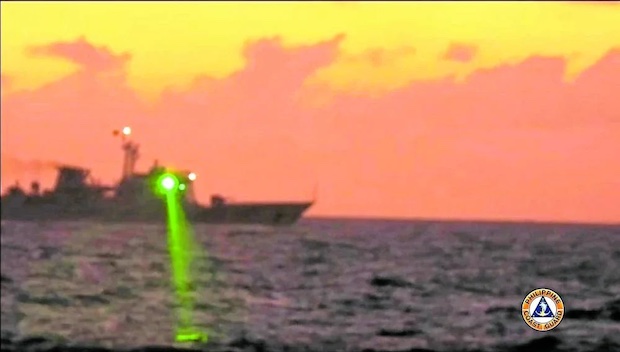AFP calls for restraint after Chinese coast guard’s provocative laser attack

NEW TACTIC | China Coast Guard Vessel No. 5205 is shown directing a laser beam at BRP Malapascua where this photo was taken on Feb. 6, 2023. (Photo from the Philippine Coast Guard)
MANILA, Philippines — The Armed Forces of the Philippines (AFP) on Monday described as provocative the recent laser attack of the Chinese coast guard against the Philippine Coast Guard (PCG).
“I think it is time for the Chinese government to restrain its forces [so] that it does not commit any provocative act that endangers the lives of the people,” AFP spokesperson Medel Aguilar told reporters in an ambush interview in Quezon City.
“We are friends, therefore, we want to be treated as friends,” Aguilar added.
Last February 6, the PCG vessel was supporting a rotation and resupply mission of the Philippine Navy in Ayungin Shoal in the West Philippine Sea when a China Coast Guard (CCG) ship with bow No. 5205 illuminated a green light twice toward the BRP Malapascua, causing temporary blindness to crew members on duty at the bridge or main command center.
The Chinese ship then crossed the bow of the PCG ship at a distance of 7.4 km (4 nautical miles), as if to warn BRP Malapascua to stop or alter course, followed by “dangerous maneuvers,” with CCG 5205 a close distance of about 150 yards from the starboard quarter of the Philippine vessel before the Chinese ship shone its laser.
Article continues after this advertisementREAD: China harasses Philippine Coast Guard vessel with laser
Article continues after this advertisementThe PCG said the Chinese action is a “blatant disregard” of the country’s sovereignty.
“The deliberate blocking of the Philippine government ships to deliver food and supplies to our military personnel on board the BRP Sierra Madre is a blatant disregard for, and a clear violation of, Philippine sovereign rights in this part of the West Philippine Sea,” the PCG said in a statement on Monday.
Ayungin Shoal, a submerged reef 194 km off Palawan province, is within the Philippines’ exclusive economic zone where the Philippine Navy maintains its presence through the decrepit BRP Sierra Madre.
China claims almost all of the South China Sea, including the West Philippine Sea.
But in 2016, the United Nations-backed Permanent Court of Arbitration in The Hague invalidated China’s claim to almost the entire South China Sea.
The tribunal ruled that China’s claim had no basis in international law and violated the Philippines’ sovereign right to fish and explore resources in the West Philippine Sea, the waters within the country’s 370-kilometer exclusive economic zone (EEZ) in the South China Sea.
The Philippines, under the administration of the late President Benigno Aquino III in 2013, challenged in the Hague court China’s claim that it owned more than 80 percent of the South China Sea, which included waters in the EEZ of Brunei, Malaysia, the Philippines, and Vietnam.
RELATED STORIES:
PH, US reaffirm Mutual Defense Treaty commitments
China, Philippines agree on direct communication channel on disputed waters